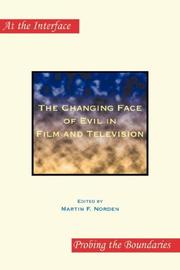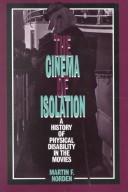| Listing 1 - 10 of 11 | << page >> |
Sort by
|

ISBN: 9789042023246 Year: 2007 Volume: 41 Publisher: Amsterdam Rodopi
Abstract | Keywords | Export | Availability | Bookmark
 Loading...
Loading...Choose an application
- Reference Manager
- EndNote
- RefWorks (Direct export to RefWorks)

ISBN: 9401205272 1435611098 9781435611092 9042023244 9789042023246 9789401205276 9042023244 9789042023246 Year: 2007 Publisher: Amsterdam New York, NY Rodopi
Abstract | Keywords | Export | Availability | Bookmark
 Loading...
Loading...Choose an application
- Reference Manager
- EndNote
- RefWorks (Direct export to RefWorks)
The popular media of film and television surround us daily with images of evil - images that have often gone critically unexamined. In the belief that people in ever-increasing numbers are turning to the media for their understanding of evil, this lively and provocative collection of essays addresses the changing representation of evil in a broad spectrum of films and television programmes. Written in refreshingly accessible and de-jargonised prose, the essays bring to bear a variety of philosophical and critical perspectives on works ranging from the cinema of famed director Alfred Hitchcock and the preternatural horror films Halloween and Friday the 13th to the understated documentary Human Remains and the television coverage of the immediate post-9/11 period. The Changing Face of Evil in Film and Television is for anyone interested in the moving-image representation of that pervasive yet highly misunderstood thing we call evil.
Good and evil in motion pictures. --- Motion pictures and television. --- Motion pictures --- Evil in motion pictures --- Moving-pictures and television --- Television and motion pictures --- Television --- Good and evil. --- Evil in motion pictures. --- Television broadcasting --- Social aspects. --- Evil --- Wickedness --- Ethics --- Philosophy --- Polarity --- Religious thought

ISBN: 0813521033 0813521041 Year: 1994 Publisher: New Brunswick, N.J. : Rutgers University Press,
Abstract | Keywords | Export | Availability | Bookmark
 Loading...
Loading...Choose an application
- Reference Manager
- EndNote
- RefWorks (Direct export to RefWorks)
Book
ISBN: 9781628464740 9781496820808 Year: 2019 Publisher: Jackson : University Press of Mississippi,
Abstract | Keywords | Export | Availability | Bookmark
 Loading...
Loading...Choose an application
- Reference Manager
- EndNote
- RefWorks (Direct export to RefWorks)
Lois Weber (1879–1939) was one of early Hollywood’s most successful screenwriter-directors. A one-time Church Army worker who preached from street corners, Weber began working in the American film industry as an actress around 1908 but quickly ascended to the positions of screenwriter and director.She wrote, directed, starred in, edited, and titled hundreds of movies during her career and is believed to be the first woman to direct a feature film. At the height of her influence, Weber used her medium to address pressing social issues such as birth control, abortion, capital punishment, poverty, and drug abuse.She gained international fame in 1915 with her controversial Hypocrites, a complex film that featured full female nudity as part of its important moral lesson. Her most famous film, Where Are My Children?, was the Universal studio’s biggest box-office hit the following year and played to enthusiastic audiences around the globe. These productions and many others contributed to her standing as a truly world-class filmmaker.Despite her many successes, Weber was pushed out of the business in the 1930s as a result of Hollywood’s institutionalized sexism. Shoved into the corners of film history, she remained a largely forgotten figure for decades. Lois Weber: Interviews restores her long-muted voice by reprinting more than sixty items in which she expressed her views on a range of filmic subjects. The volume includes interviews, articles that Weber wrote, the text of a speech she gave, and reconstructed conversations with her Hollywood coworkers. Lois Weber: Interviews provides key insights into one of our first great writer-directors, her many films, and the changing business in which she worked.
Book
ISBN: 9781474454513 Year: 2021 Publisher: Edinburgh : Edinburgh University Press,
Abstract | Keywords | Export | Availability | Bookmark
 Loading...
Loading...Choose an application
- Reference Manager
- EndNote
- RefWorks (Direct export to RefWorks)
Silent-era film scholarship has all too often focused on a handful of German directors, including Fritz Lang, F. W. Murnau and Ernst Lubitsch, but little attention has been paid to arguably one of the most influential filmmakers of the period : Paul Leni. This collection – the first comprehensive English-language study of Leni’s life and career – offers new insights into his national and international films, his bold forays into scenic design and his transition from German to Hollywood filmmaking
Motion pictures --- Motion pictures --- Expressionism in motion pictures --- Production and direction --- History. --- Production and direction --- History. --- Leni, Paul,
Book
ISBN: 1474454518 1474454526 1474454534 1474454542 1474495362 Year: 2021 Publisher: Edinburgh University Press
Abstract | Keywords | Export | Availability | Bookmark
 Loading...
Loading...Choose an application
- Reference Manager
- EndNote
- RefWorks (Direct export to RefWorks)
Book
ISBN: 152753068X Year: 2019 Publisher: Newcastle upon Tyne, UK : Cambridge Scholars Publishing,
Abstract | Keywords | Export | Availability | Bookmark
 Loading...
Loading...Choose an application
- Reference Manager
- EndNote
- RefWorks (Direct export to RefWorks)
Digital

ISBN: 9781474412957 9781474412940 Year: 2022 Publisher: Edinburgh Edinburgh University Press
Abstract | Keywords | Export | Availability | Bookmark
 Loading...
Loading...Choose an application
- Reference Manager
- EndNote
- RefWorks (Direct export to RefWorks)
Multi

ISBN: 9781474454537 9781474454513 Year: 2022 Publisher: Edinburgh Edinburgh University Press
Abstract | Keywords | Export | Availability | Bookmark
 Loading...
Loading...Choose an application
- Reference Manager
- EndNote
- RefWorks (Direct export to RefWorks)
Silent-era film scholarship has all too often focused on a handful of German directors, including Fritz Lang, F. W. Murnau and Ernst Lubitsch, but little attention has been paid to arguably one of the most influential filmmakers of the period : Paul Leni. This collection – the first comprehensive English-language study of Leni’s life and career – offers new insights into his national and international films, his bold forays into scenic design and his transition from German to Hollywood filmmaking
Art --- Motion pictures --- Expressionism in motion pictures --- Production and direction --- History. --- Leni, Paul,
Book

ISBN: 9781474454537 Year: 2022 Publisher: Edinburgh
Abstract | Keywords | Export | Availability | Bookmark
 Loading...
Loading...Choose an application
- Reference Manager
- EndNote
- RefWorks (Direct export to RefWorks)
| Listing 1 - 10 of 11 | << page >> |
Sort by
|

 Search
Search Feedback
Feedback About UniCat
About UniCat  Help
Help News
News